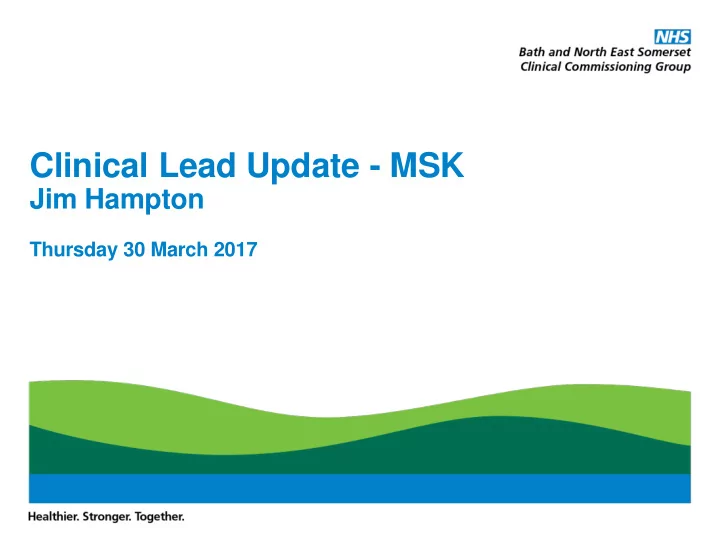

Clinical Lead Update - MSK Jim Hampton Thursday 30 March 2017
Overview of the aims for MSK services • To develop community based MSK services with a single point of access • To include orthopaedics, pain management and rheumatology • Multi-disciplinary, one-stop clinics • Patient seen in the right place at the right time • Focus on supporting patients to self manage • Will help to manage the growing demand for MSK services with an ageing population
MSK Community Service Model Social care Community Psychology Education Podiatry Patient Exercise for CPD Discharge Follow-up Physiotherapy health d Clinical Rheumatology Governance Community Service One stop – diagnosis, treatment, specialist physiotherapy, podiatry Further work up + assessment, injection clinics diagnostics Secondary Care ESP Choice of hospital (Training) GPwSI offered to patient via PRIMARY S C&B Podiatry CARE P TRIAGE A ENP Clinician GP Rheumatology ESP Service to Consultants - Rheumatology provide Pain clinic Sport/MSK Medicine pathways, Specialist radiology Patient Radiologist involvement Pain clinic Joint injections Diagnostics Full admin, IT support OUTCOMES Red flags Systemic disease
Previously…….. • Developed the Hip and Knee programme and evaluated the outcomes in 2015 • Carried out a Needs Assessment for hip and knee replacements in 2016, to inform the future commissioning requirements for BaNES
Overview of Needs Assessment • Needs Assessment completed to ensure H&K arthroplasty meets the needs of the population. • Increasing elderly population will lead to a £1M+ increase in costs – unaffordable. • Good overall arthroplasty outcomes but could be further improved e.g. extend physiotherapy • Highlighted the need to simplify the referral pathway as there were many different routes of referral.
Hip & Knee programme - Outcome Data • National and regional benchmarking data consistently identified BaNES as an outlier for hip and knee replacement surgery rates • 40% of patients who attend the programme go on to self- manage rather than have surgery • 47% are directly referred for surgery • Approximately 14% of patients who complete the programme and decide to self-manage, subsequently present for surgery within a year • The length of stay for those who go on to have surgery, on average spend 1.5 bed days less than those not attending the programme
Update on 2016/17 MSK Plans (1) Orthopaedics: • Reported on the outcomes of a Needs Assessment for Hip and Knee replacements to GPs and local secondary care clinicians • Introduced the use of RSS for all orthopaedic referrals except ‘red flags’ and 2ww • Patients referred to the RSS in the first instance and then referred on to the OIS, Hip & Knee programme or secondary care as appropriate • Increased the capacity of the Hip & Knee programme
Update on 2016/17 MSK Plans (2) • Developed a Patient Information Leaflet for the Hip & Knee Programme • Reviewed and revised several MSK commissioning policies including patellar resurfacing and direct access to MRIs Pain Management: • Established an interim Community Pain service to support GPs with managing patients who do not meet the RUH revised referral criteria • Developed a Back Pain and Sciatica pathway with local providers and commissioners, which is now being implemented through a recently convened local implementation group
Total savings to the CCG CCG Total Savings Hip Knee Total 2014/15 (Oct – Mar) £233,680 £399,546 £633,226 2015/16 £268,732 £599,319 £868,051 2016/17 (Apr – Jan) £186,944 £695,506 £882,450 £2,383,727 Savings as part of QIPP, in each of the periods CCG Total QIPP Savings Hip Knee Total 2014/15 (Oct – Mar) £233,680 £399,546 £633,226 2015/16 £134,366 £325,556 £459,922 2016/17 (Apr – Jan) £40,894 £281,162 £322,056 £1,415,204
Next steps: • Develop a comprehensive community pain management service during 2017/18 • To scope the potential to develop community based Rheumatology services e.g. patient initiated follow up appointments, support for patients to self-manage • Develop proposals for community MSK hubs • To extend the Referral Support Service to include Rheumatology in 2017
Recommend
More recommend